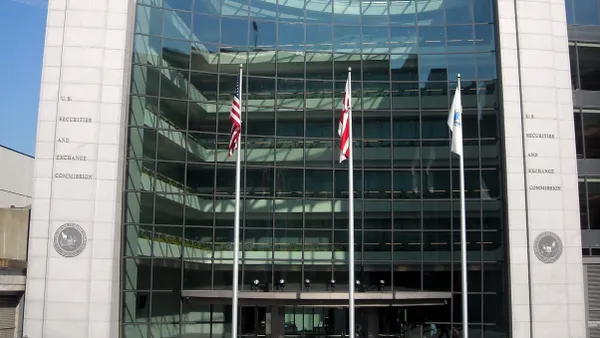Roughly 60% of dealmakers in the U.S. and Canada expect M&A activity to increase this year following several quarters of contraction, according to a report from Norton Rose Fulbright.
This anticipation comes amid consistent inflation and high interest rates, as well as a recognition by professionals involved in M&A that regulatory risks pose potential obstacles.
However, a key reason for the optimism is pent-up dry powder, with nearly 60% of survey respondents saying they expect global private equity buyers to be the most active prospective acquirers.
U.S. private equity firms in particular are expected to lead the M&A charge, according to the Global M&A Trends and Risks report.
“In addition to opportunities at home, U.S. private equity funds are going to be looking outbound,” said Ayşe Yüksel Mahfoud, Norton Rose Fulbright’s global head of corporate, M&A and securities. “The dollar is still relatively strong, so there is going to be continued interest in European and Asian targets.”
Sector activity
The Norton Rose Fulbright report was produced in collaboration with Mergermarket and features results from a survey of 200 senior executives from leading corporations and financial institutions.
Nearly two-thirds of respondents (63%) identified the technology sector as among the top three industries in which they expect to see growth in inbound cross-border M&A this year.
The pervasive nature of tech across sectors is a key reason it was listed more frequently than other options, and the Norton Rose Fulbright report said tech accounts for more than a quarter of all global dealmaking by volume and value.
The life sciences and healthcare sector is also expected to be a significant inbound deal generator in 2023, as 52% of respondents selected it as one of their top-three performers.
Coming in third place was business services, with 45% of respondents expecting that sector to see strong performance this year.
“Aside from their significant growth potential, one thing that unites technology, life sciences and healthcare, and business services is that they are all sectors which respondents expect to be least affected by inflation in 2023,” the Norton Rose Fulbright report said.
Data privacy risks
Meanwhile, stricter regulation is cited by 60% of respondents in the U.S. and Canada as posing a threat to M&A activity.
More than half of the respondents in those two countries pointed to cybersecurity regulation as of great concern.
On a related note, nearly one-third of respondents from those North American nations highlighted potential impacts from data protection and privacy regulations.
“Prior to Europe’s General Data Protection Regulation and the California Consumer Privacy Act, data protection and privacy were not a huge aspect of due diligence. That has now shifted,” said Scarlet McNellie, Norton Rose Fulbright’s head of corporate, M&A and securities in the U.S.
Antitrust concerns
Half of the respondents in the U.S. and Canada also said that antitrust regulations could suppress M&A deals.
In the U.S. the Biden administration has aggressively pursued legal and regulatory action to halt deals it believes are anticompetitive.
Additionally, Canada has “seen more litigation by the Competition Bureau over the last 12 months than for several years previously,” said Chris Hersh, partner and head of antitrust and competition for Norton Rose Fulbright in Toronto.
When respondents were asked to name the countries they believe will see the biggest uptick in antitrust-related scrutiny in 2023, the U.S. was mentioned by 94%.
The only other countries named by more than half of the respondents were the UK (78%) and Germany (55%).

The survey respondents included 100 top-level executives from multinational corporations, as well as 50 from large private equity firms and 50 from major investment banks.
The bulk of the respondent group (40%) is headquartered in the U.S. and Canada. The survey was conducted in Q1 2023.











